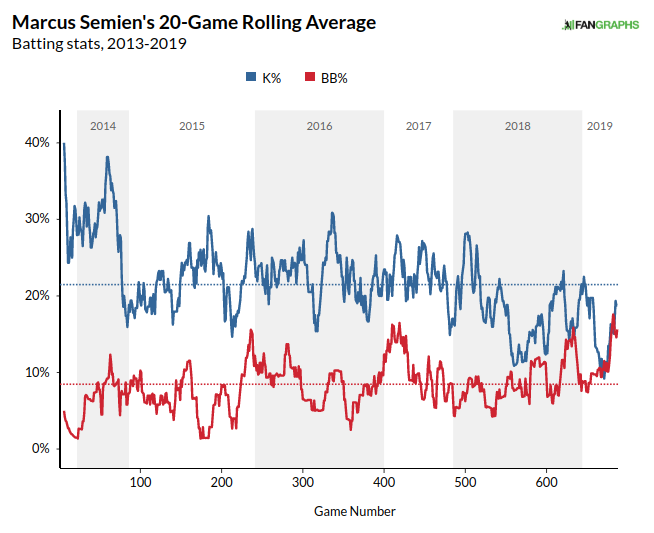Below is an analysis of the prospects in the farm system of the San Francisco Giants. Scouting reports are compiled with information provided by industry sources as well as from our own (both Eric Longenhagen’s and Kiley McDaniel’s) observations. For more information on the 20-80 scouting scale by which all of our prospect content is governed you can click here. For further explanation of the merits and drawbacks of Future Value, read this.
All of the numbered prospects here also appear on The Board, a new feature at the site that offers sortable scouting information for every organization. That can be found here.
Other Prospects of Note
Grouped by type and listed in order of preference within each category.
Power Bats
Diego Rincones, OF
Zach Green, 3B/1B
Sandro Fabian, OF
Jacob Heyward, OF
Kwan Adkins, OF
Rincones, 19, is a plump corner outfielder with quick, strong hands. He’s posted two consecutive years of strong offensive statistics (AZL and NWL) and has plus raw power, but he’s a corner-only guy with a high-maintenance build, so he’ll need to keep doing that. Green was a minor league free agent who had an average exit velo of about 95 mph through this season’s first month. He has plus-plus power and barely hits the ball on the ground (25% GB%). Fabian looked like a potential contact/power corner outfielder but his approach is just too aggressive and he’s posted sub-.300 OBPs for two years. Heyward, 23, is a bit older than most prospects at Double-A but he has plus raw power and athleticism. He needs to keep walking a lot to balance the strikeouts. Adkins was a two-sport athlete at Northwestern State (he played wide receiver as a junior) who didn’t have statistical success in college, but has so far flashed all-fields power against younger pro pitching.
Relief Potential
Sam Coonrod, RHP
Garrett Williams, LHP
Franklin Van Gurp, RHP
Kervin Castro, RHP
Coonrod touches 99 and has a pretty good cutter and curveball. Williams is a low-90s lefty with a plus curveball but he’s quite wild. Van Gurp could be a traditional sinker/slider reliever if he develops above-average command. Castro is a projectionless 20-year-old who throws hard (93-96 this spring) with flat, up-in-the-zone plane that’s suited for missing bats. His secondaries are raw, but he missed most of the last two years with injury.
Younger Sleepers
Ismael Munguia, OF
Ghordy Santos, INF
Andrew Caraballo, INF
Izzy Munguia is a tiny corner outfield prospect with great feel to hit. His power is limited. He’ll likely need to be a 7 bat to profile. Santos and Caraballo are each built like Jorge Polanco. Santos has plus bat speed and some low-ball ability. Caraballo has plus infield hands and actions and Eric thought he saw him breaking in a catcher’s mitt on the backfields.
System Overview
This rebuild could take a while. There’s probably a dominant, homegrown bullpen in this system but most of the pitchers who’ll be part of it are already in their mid or late-20s. There’s a huge timeline gap between that group and the more exciting, potentially impactful group of teenagers (mostly bats) who are, by and large, currently in rookie and A-ball. Parlaying current big leaguers and upper-level prospects into long-term assets will be an important part of accelerating a return to competitiveness. That means nailing a seemingly imminent Madison Bumgarner trade. Scouts from opposing clubs are already deviating from their normal coverage to get extra looks at the left-hander so their teams have as much info as possible as we approach June and July.
Now that the org is under new leadership, the way talent is acquired and developed will change, but we’re not yet sure exactly how. It seems as if early priorities involve throwing fringe roster guys like Connor Joe, Aaron Altherr, and Breyvic Valera at the wall to see who sticks. Expect the Giants to try to find diamonds in the rough on the waiver wire who they’ll likely look to flip for long-term help rather than keep around.
We’ve seen Giants personnel at amateur games with the same model camera we’re using to take high-speed video, so they’re proactively entering that space. It’s likely their new Ops leader, Farhan Zaidi, will bring Dodger player dev concepts with him to San Francisco because the Dodgers have been so good at improving their players, but some of LA’s more prominent scouting tendencies (injured arms, toolsy college hitters with contact red flags, talent from Mexico) will be harder to replicate effectively because the Dodgers still exist in those spaces, too.

